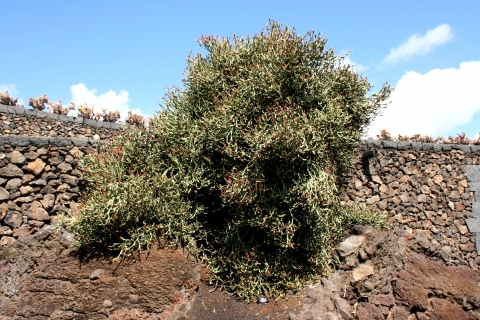Euphorbia enterophora
Drake
Euphorbiaceae
Tirucalia enterophora (Drake) P.V.Heath
Common Name:

Cultivated plant in the Botanical Garden 'Jardin de Cactus' in Guatiza, Teguise, Lanzarote, Canary Islands
Photograph by: Frank Vincentz
Creative Commons Attribution-Share Alike 3.0
General Information
Euphorbia enterophora is an evergreen, succulent tree
The tree is sometimes harvested from the wild for the wax that is formed on its trunk. It is also planted as a pot plant and sold as such on the internet[
299- Title
- Protabase - Plant Resources of Tropical Africa.
- Publication
-
- Author
-
- Website
- http://www.prota.org
- Publisher
-
- Year
- 0
- ISBN
-
- Description
- An excellent on-line database with detailed information on over 3,200 species of useful plants of Africa.
].
The typical subspecies has a large extent of occurrence (113,423 km²) and a large area of occupancy (42,844 km²). It is recorded from 38 localities and comprises six to twelve subpopulations. There are some threats (from habitat degradation, fire, habitat clearing for charcoal, and collection for horticultural purposes), but these do not yet trigger a threatened status. The plant is classified as 'Least Concern' in the IUCN Red List of Threatened Species(2013)[
338- Title
- IUCN Red List of Threatened Species
- Publication
-
- Author
-
- Website
- http://www.iucnredlist.org/
- Publisher
-
- Year
- 0
- ISBN
-
- Description
- A list of plants under threat and facing possible extinction, usually with brief details of the threats and information on habitat.
].
Known Hazards
Although we have seen no specific information for this plant, the latex in most, if not all Euphorbias is caustic and toxic - skin contact often causing irritation and blistering; contact with the eyes causing temporary or even permanent blindness; whilst ingestion can cause purging or more severe problems[
K- Title
- Plants for a Future
- Author
- Ken Fern
- Description
- Notes from observations, tasting etc at Plants For A Future and on field trips.
].
Botanical References
Range
Africa - Madagascar.
Habitat
Located in the south-west bush of Madagascar (dry forest), or on rocks and inselbergs of the central high plateau[
338- Title
- IUCN Red List of Threatened Species
- Publication
-
- Author
-
- Website
- http://www.iucnredlist.org/
- Publisher
-
- Year
- 0
- ISBN
-
- Description
- A list of plants under threat and facing possible extinction, usually with brief details of the threats and information on habitat.
].
Properties
| Conservation Status | Least Concern |
| Other Uses Rating |      |
| Habit | Evergreen Tree |
| Height | 0.00 m |
| Cultivation Status | Ornamental, Wild |
Cultivation Details
Not known
Edible Uses
None known
Medicinal
None known
Other Uses
The trunk is covered with a wax, which has been used for polishing[
299- Title
- Protabase - Plant Resources of Tropical Africa.
- Publication
-
- Author
-
- Website
- http://www.prota.org
- Publisher
-
- Year
- 0
- ISBN
-
- Description
- An excellent on-line database with detailed information on over 3,200 species of useful plants of Africa.
].
Propagation
Seed -
Cuttings root easily. They need to be stored in light shade for a few days to dry before being planted, or else they will rot. It is best to plant the cuttings when the rain is about to stop, in a well-drained soil[
299- Title
- Protabase - Plant Resources of Tropical Africa.
- Publication
-
- Author
-
- Website
- http://www.prota.org
- Publisher
-
- Year
- 0
- ISBN
-
- Description
- An excellent on-line database with detailed information on over 3,200 species of useful plants of Africa.
].
If you have any useful information about this plant, please leave a comment. Comments have to be approved before they are shown here.









 Useful Tropical Plants Database 2014 by
Ken Fern,
web interface by
Ajna Fern
with help from
Richard Morris.
Useful Tropical Plants Database 2014 by
Ken Fern,
web interface by
Ajna Fern
with help from
Richard Morris.